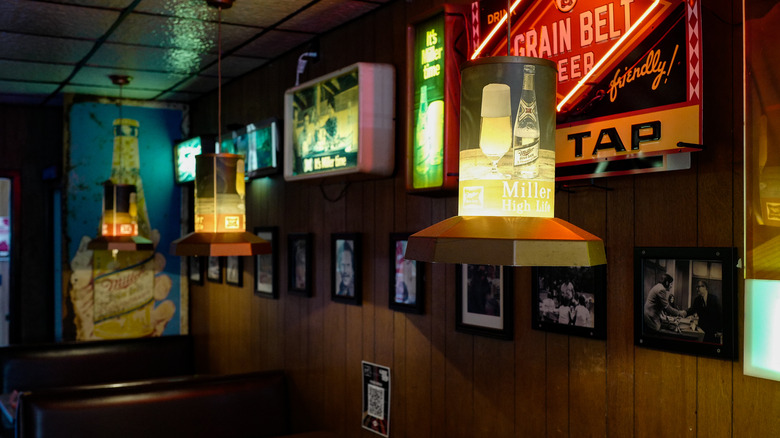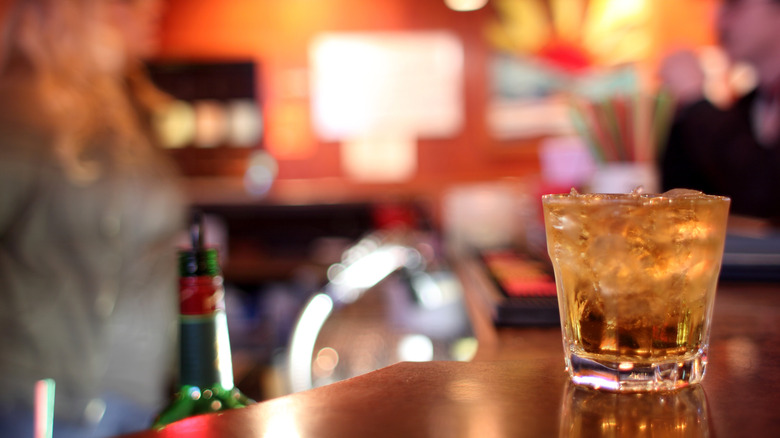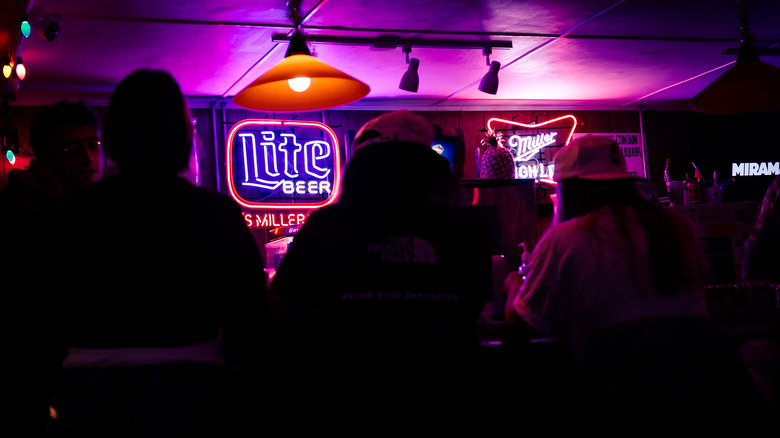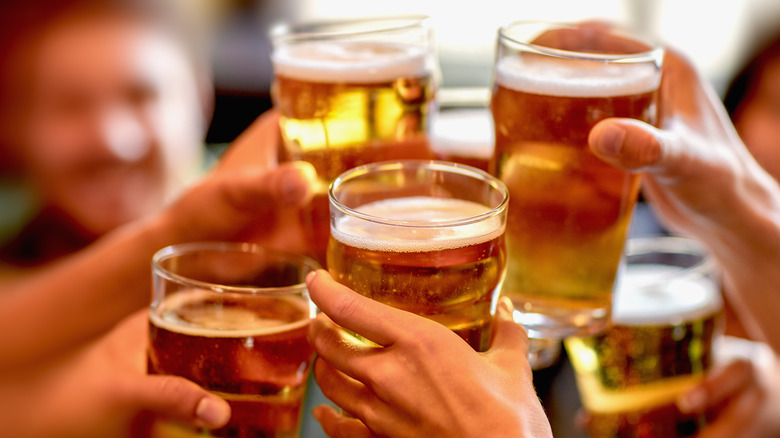Why The Dive Bar Is So Difficult To Define
Let us set the scene: It's Friday night. You've clocked out of work for the week, your blue jeans are on, and you're headed to your favorite neighborhood spot. The bar is lined with locals. The walls are covered in wood paneling, rainbow string lights, and neon signs advertising beer brands you've been ordering for decades. In the back of the joint, maybe there's a $2 pool table; perhaps it's free. You know it, you love it — the humble dive bar.
It needs no further introduction than that, yet upon further consideration (as if you needed another reason to consider a $6 beer and a shot), the dive bar is perplexingly difficult to define.
Some folks associate unfavorable connotations with the holy "dive" label. Per Eater, various definitions of "dive bar" include adjectives like "disreputable" and "shabby." Thrillist offers a particularly scathing definition: "Dives reek of desperation, puke, and dust. They're called dives because they exist beneath society, where squalor and vermin reign." (Yikes.)
But don't get it twisted. When we talk about dives, we're not talking about Methuselah-level dated hovels in desperate need of a little Pine-Sol. So, what constitutes a "dive"?
The elusiveness of dive vibes
For pedagogical purposes, the unofficial definition of a "dive bar" is "any cheap bar with a local flavor." Seasoned barflies will immediately recognize a dive when they see it. As Eater puts it, dive bars are "mostly about feel." Dives can be dark or bright, loud or quiet, big or small, old or new, which makes it difficult to put a tangible definition into words.
According to cocktail historian David Wondrich, there are different taxonomic classifications of "bar types" as well, and "dive" has been wrongly used as an umbrella term to refer to any laid-back drinking establishment. "A dive bar is different from a neighborhood bar as a neighborhood bar is drawn from the people in the neighborhood; and what your neighborhood is, is how the bar is," Wondrich explains (via VinePair). So, a dive might be a neighborhood bar, but not all neighborhood bars are dives.
It's a highly nuanced, elusive definition — if a definition exists at all. But, ultimately, while dive bars may attract a crowd of locals, "informality" is the true name of the dive-y game. Here's what it looks like.
Simple offerings that don't change
Dive bars are as honest as the Pope swearing into a witness stand. You won't find anything pretentious about a dive. They open early and stay open late, prefer cash, offer limited food options, and probably have a jukebox, states Vine Pair. And a fairly consistent aspect of the dive bar is minimal staffing, according to Eater. You'll see one person behind the stick at a time — two, tops.
In addition to bottles, cans, and a few draft taps, the back bar will be stocked with a couple of tequilas, vodkas, a "well" and a "top shelf" whiskey, and maybe a bottle of Angostura bitters. The fanciest cocktail you're ordering here is a vodka soda. If you shout "sloe gin fizz" across the bar, don't be surprised when nobody seems particularly conversational as the night goes on.
Another defining characteristic of dives is that they're unchanging, per Vine Pair. Dive bar fans don't step into the joint looking for updates or asking, "What's new?" The answer is always "Nothing." — that's the appeal. Dive bars are familiar and consistent in a world that so seldom is.
Dive bars foster a sense of community
Perhaps the most notable and unique characteristic of the dive bar zeitgeist is its defining sense of community. Dive bars are characterized by repeat customers, aka "regulars," as they foster a communal atmosphere with a working-class sensibility.
They're conducive to impromptu conversations with strangers; unlike at a restaurant, it isn't weird to start talking to the person sitting beside you. It's a highly social scene; Bon Appétit notes people-watching as one of the best things to do at a dive bar. As bar culture writer Robert Simonson observes, "Some of them feel downright dangerous. Others are welcoming, like a dingy old rec room" (via Vine Pair).
True dive bar fans know that to be called a "dive" is to be recognized as an establishment of warmth, familiarity, safety, and comfort. Maybe it's more similar to visiting somebody's home than sitting cross-legged at a wine-tasting party. (That person's home just happens to be plastered with punk band stickers and scribbled over with a Markal crayon.)



